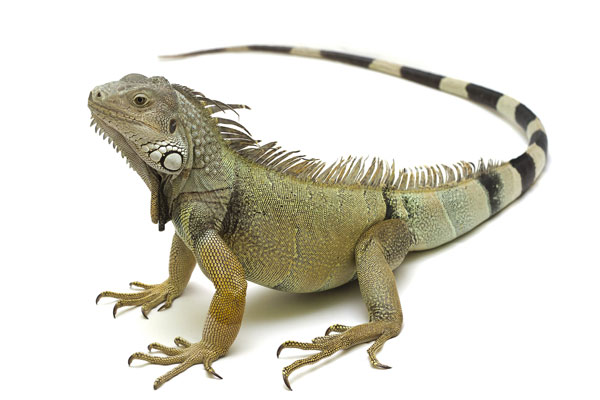Prevent access to potentially dangerous substances and objects found around the house.
While it’s not generally recommended, some people allow their larger reptile pets, such as green iguanas (Iguana iguana)and monitor lizards (Varanus spp.), to free-roam around their houses. If you choose to do this, always be absolutely sure you have made efforts to prevent them from coming into contact with poisons and other potentially toxic substances, including those that may be used in common household products.

Photo by Che_Tina_Plant/Thinkstock
Think twice before allowing large reptile pets, such as green iguanas, to roam freely in your house.
There are certain areas in which dangerous stuff is likely to be stored, and you must be sure your roaming iguana, etc., can’t get into those areas. The storage area under your kitchen sink, for instance. The last thing you need is for your big lizard to get in there and use its tongue to investigate a container of dishwashing detergent, Brillo pads and other soapy stuff, cleansers, window-washing fluid, etc. Reptiles lead with their tongues, after all—it is their primary investigative tool—and many things typically stored beneath a kitchen sink would not be good for a reptile’s tongue to explore.
Likewise, your animals should not be able to wander into laundry rooms, the garage, bathrooms, or anywhere else you store household cleaning and other potentially toxic products, including motor oil, drain cleaner, mothballs, etc.
Other potential danger areas are where electrical devices gather, such as that power strip behind your couch that has six components plugged into it, or beneath and behind appliances or furniture where you may have placed mouse or insect traps; the latter, especially, may contain poisons that could prove very dangerous to your pets. Keep in mind, too, that while live plants might seem like a natural hang-out area for a wandering pet green iguana, some plants are toxic to reptiles, and you also want to be sure your pet doesn’t come into contact with any fertilizers/plant food you might use on your household plants.
Maksym Yemelynov/iStock
If you must allow pet reptiles to roam freely, you must be sure they can’t come into contact with potentially toxic substances such as household cleaners, etc.
As opposed to allowing a large pet lizard or snake to lounge in a sunny spot on your sofa while you sit nearby watching television, as mentioned, unsupervised free roaming for reptiles is not usually recommended. If you insist on allowing your pets this freedom, always be sure to plan ahead, do a thorough walk-through of the areas to which your pets would have access, and take the necessary precautions to ensure you don’t end up regretting your decision later, after your lizard samples some scouring powder or oven-cleaning residue it finds in a cabinet somewhere.
Want to Learn More?
List of Plants That Can Be Toxic To Reptiles
Reptile-Safe Plants, Insects And Foods



